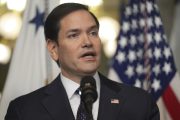
On or before September 1, President Obama will complete the eight appointments to the oversight board created when he signed PROMESA (Puerto Rico Oversight, Management and Economic Stability Act) into law on June 30. Those already on the board include Republican Senators Orrin Hatch and Marco Rubio, Democrat Senator Bill Nelson and Congresswoman Nydia Velázquez.
In theory the board will have the power to override the island’s government, delay litigation, fire government workers, and “suggest” other ways the island can begin to recover from its present economic implosion. It has been described as a “de facto” Chapter 9 bankruptcy. In practice it is likely that, in the end, a U.S. taxpayer bailout will be implemented.
The numbers are simply awful. Including the $72 billion the island owes its debtors and the $43 billion it owes to its pensioners, the total is more than 110 percent of the territory’s total economic output in a year. Its pension plans have less than $2 billion in reserves and are expected to default on retirees’ checks within three years.
The island has already defaulted on nearly a billion dollars of debt payments since President Obama signed PROMESA into law. It gets worse: The island’s population has dropped by almost 10 percent in the last decade, removing mostly skilled professionals from the economy. Nearly half of those remaining live below the poverty level, making it worse than Mississippi, the poorest state in the country.
In simple terms the island is suffering the end game of government spending that, up until February 2014, appeared to have no limit. (Picture a credit card without a limit.) The island’s politicians have made the image of “drunken sailors on shore leave” appear almost austere.
Since 1973, the territory’s government took advantage of the “triple-tax-exemption” granted to it by Congress (taxes on interest from the bonds are exempt at the federal, state, and local levels), investors have been more than willing to fund the island government’s profligacy.
The Puerto Rican government was also taking advantage of another congressional “assist” — a law that allowed manufacturers with facilities located on the island to send their profits back to the United States without incurring any tax liability. This was an open invitation to drug makers such as Eli Lilly, Merck, and Johnson & Johnson, which seized the opportunity. Within a few years, nearly 10 percent of Puerto Rico’s labor force was directly or indirectly tied to those companies.
The law was changed in 2006, and the companies laid off thousands of workers. As the economy shrank, the government maxed out its credit card, using false Keynesian economic hopes that spending hundreds of millions on government “make-work” projects would somehow stimulate the private economy. For instance, the island’s Government Development Bank funded a series of projects, including a $415 million convention center, golf courses, and hotels, several of which failed shortly after being completed.
When the debt-to-GDP ratio hit 71 percent in 2014, the party ended: Within days all three of the major credit rating agencies reduced the island’s bond ratings to junk status. This triggered various “acceleration” clauses in those bond issues, forcing the territory to face reality: The island was broke, with little chance of it coming back from its tailspin. On June 28 the island’s Governor Garcia Padilla publicly admitted what had been hidden for so long: “[Puerto Rico’s] debt is not payable,” adding, “We will be in a death spiral” unless something is done.
Instead of granting the island Chapter 9 bankruptcy powers, which would allow Puerto Rico to bargain with creditors to resolve debt issues, just as the states can do, Congress in its infinite and infamous wisdom decided instead to create an oversight board. In the run-up to its official launch on September 1, the nascent board has leaked various suggestions to the press: collect more taxes (the tax bureau is notoriously inefficient, allowing more than $900 million in back taxes to remain uncollected), cut the salaries of the overpaid government bureaucrats (many of whom make $75,000 a year while teachers make just $24,000), force the government to create and follow a budget (the island has been notoriously late in filing its financial reports), and “negotiate” a settlement with bondholders to take a haircut (accept less, perhaps much less, than face value for their bonds).
If an agreement can’t be reached, the board then has the power to appoint a judge to enforce its recommendations.
In a free market, everyone would take a serious hit: The bondholders (mostly municipal bond funds in the United States) would be forced to write off most of their Puerto Rico bonds, the pensioners would have their expectations cut drastically, and government spending would be severely cut back.
But neither Puerto Rico nor the board is likely to do any such thing, simply because of the various political and financial interests involved. For example, investment funds such as insider John Paulson’s Paulson and Company, David Tepper’s Appaloosa Management, Marathon Asset Management, Blue Mountain Capital, and Monarch Alternative Capital each swooped in and took substantial positions in Puerto Rico’s debt just days after the rating agencies dropped their ratings to junk. Now they hold hundreds of millions in bonds, selling at massive discounts against their face value and have little interest in negotiating anything.
What’s more likely is that they will bring pressure on the board members to go to investors’ “last resort,” the American taxpayer. After all, the island’s pensioners are already poor and have been forced to pay ever higher taxes as the government tried to right itself. And a government reorganization, eliminating overpaid bureaucrats and setting up a badly needed system of meritocracy to weed out incompetents, is simply not going to happen.
The pressure to pass the buck to the American taxpayer has already begun. Obama officials Jack Lew (secretary of the treasury) and Sylvia Burwell (secretary of health and human services) sent a letter to the oversight board last week with its “suggestions”:
Reforms should include removing the cap on Puerto Rico’s Medicaid program and gradually increasing the federal support Puerto Rico receives through the federal Medicaid match.
The letter also included “adopting” an earned income tax credit — essentially a welfare check to the poor — in order to “pull 54,000 Puerto Ricans out of poverty.”
It’s much easier to pass the buck to the only place that still has the capacity to bail the island out: the U.S. taxpayer. Following that bailout, those vulture funds will then see their bonds return to face value and sell them, reaping enormous profits from the misery being inflicted on the residents of the United States’ island territory.
A graduate of an Ivy League school and a former investment advisor, Bob is a regular contributor to The New American magazine and blogs frequently at LightFromTheRight.com, primarily on economics and politics. He can be reached at [email protected].
Related article:
New Bailout Bill for Puerto Rico Supposedly “Won’t Cost Taxpayers a Dime”


